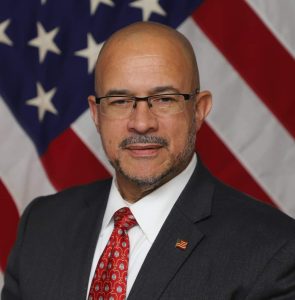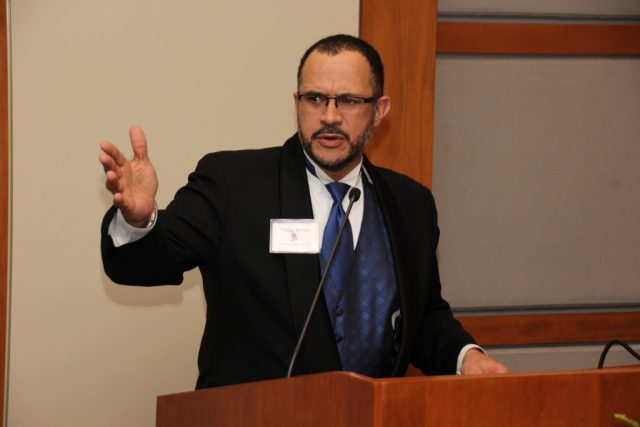By Barnett Wright | The Birmingham Times
Before Donald Trump was first elected president of the United States eight years ago, Phillip Brown made it very clear that he was an ardent supporter. Since that race in 2016, another in 2020, and again this year, Brown never wavered in his backing of the Republican billionaire.
Brown is more than just a Trump die hard. He’s also chairman of the Alabama Minority Grand Old Party (GOP) and among very few Black Republicans in a heavily red state.
As expected, Trump easily won Alabama and its nine electoral votes on Tuesday, November 5, after receiving 1,457,704 votes, or 64.8 percent, to Democrat nominee Vice President Kamala Harris’ 769,391 votes, or 34.2 percent, part of a red wave that returns Trump to the White House.
Nationally, Trump made inroads with Black Latino voters, according to exit polls. While those groups still largely supported the Democratic Party and Harris, Trump’s election night victory showed dramatically growing support from previously reliable Democratic mainstays.
“This Is Insane”
Brown said he was not surprised. “Our communities, our cities, and our schools are still in disarray after 75 years of supporting Democrats across the board,” he told The Birmingham Times in a recent interview. “I think you’re overlooking the fact that there are some people in the Black community who are not just upset anymore—they’re angry.”
“Take a look at Chicago, [Illinois], … where they’ve closed down parks, they’ve closed down schools and condemned them, saying they were beyond repair. … [Then] they’ve shipped migrants [to the city], reopened and renovated [those same facilities], and given them to the [migrants],” he continued. “You’ve got people standing in city council meetings saying, ‘This is insane. Why are we as Black people always at the bottom of the barrel? You’ll bring folks from out of the country and put them over us?’”
“The Democrats have always believed that no matter what they do or don’t do, Black people will still vote Democrat,” said Brown.
Judicial System
Brown has a theory about why Trump did well with some Black voters who didn’t go with Harris.
“Let’s overlook the fact that she never would state a policy she believed in. Let’s disregard that,” he said. “Let’s go back to when she was a prosecutor in California. She locked up more Black folks than you can imagine. It was almost like a policy issue to her.”
Supporters of Vice President Harris say many of the people locked up needed to be off the streets and she was as tough on crime regardless of race.
As for Trump being convicted of 34 felony counts of falsifying business records alleging he was involved in a scheme that sought to cover up extramarital affairs in advance of the 2016 presidential election, Brown said many may have missed a key point for some Black voters.
“Let’s start with the criminal prosecution. How familiar are you with the term ‘street cred?’ I’ve taught young men who have been to juvenile [detention]. [When] they would come back and I would try to talk to them about getting their life together so they could rise above their past, you would think that having gone to prison was a plus for them by the way they acted,” said Brown, who retired this year from Jefferson County School System after 22 years of teaching automotive technology at Minor High School and Shades Valley High School.
 He added, “There are a lot of young Black men who identify with the judicial system jamming you up a lot.”
He added, “There are a lot of young Black men who identify with the judicial system jamming you up a lot.”
Democrats have lambasted that line of thinking. Former Louisiana Rep. Cedric Richmond, a chief strategist for the Harris campaign, said at the time, “Donald Trump claiming that Black Americans will support him because of his criminal charges is insulting. It’s moronic. And it’s just plain racist.”
“Natural Fit”
Brown, 60, was born in Detroit, Michigan, and raised in Elba, Alabama, the 10th of 12 children of the late Hayward and Jean Brown. He has been a resident of the Birmingham area for more than 30 years.
The Alabama Minority GOP chairman’s dad was a minister who “believed that in order to be a real Christian you had nothing to do with government,” he recalled. “If you voted at all, … that meant you were part of the problem.”
Brown said he began to assess the values of the Republican and Democratic parties and “felt like [the GOP] was a natural fit.”
“I didn’t realize that Black folks weren’t Republicans,” he said. “If you look at the Black church, 90 percent of what you see is conservative. We believe in personal responsibility. We believe life is precious, so therefore abortion is wrong. We believe in the traditional concept of marriage. Most in minority communities believe in conservative thought, so why do we have such a disconnect between our faith in God and our actions in the voting booth?”
Chair of the state Minority GOP since 2012, Brown, who is also an elder at the Bessemer 24th Street Church of Christ, said African American membership in the state party is in the low 100s “but a lot higher than it used to be.”
“A Lot Of Abuse”
He ran unsuccessfully for the Jefferson County Board of Education in the November 5 election and said he’s used to being questioned about his political affiliation: “Trust me, I know the pressure of the Black community against Republicans. I’ve lived in it for years, [being] the only one in your family that has a Republican identification, [being] the only one in your circle of friends that believes that you have the right to think for yourself.”
“I have taken a lot of abuse because of what I believe in,” Brown continued. “I don’t believe in it because I need white folks to like me because, personally, I do not care. … When you stand on principle, it’s not hard to make a decision. If you know what your principles are, decisions aren’t that hard to make. … I believe in certain principles. … My principles and my beliefs come from my Christian values, and they carry across into the political spectrum. … I’ve lost friends over my position on politics, but that’s part of the deal.”
Brown said he’s seen Democrats continue to make the same mistakes in elections, including this presidential cycle.
“If Black people always vote exactly the same way, regardless of the circumstances, we become irrelevant,” he said. “We’ve got to have people on both sides of this issue tell the powers that be, ‘You’d better pay attention to our demands because we can vote Republican just like we can vote Democrat.’ [If] we were willing to do that, then we wouldn’t be ignored.
“… If we continue to vote in people because they are Black or because there’s an issue [we] don’t like rather than looking across the board and saying, ‘It doesn’t matter to me whether you’re Black, White, Indian, Asian, Mexican, Jamaican, it doesn’t matter. … The question is, are you going to take care of the sacred trust that we give you if we vote for you?’ Until we start thinking like that, we’re always going to lose.”
As the interview ends, Brown is asked one final question: Did Donald Trump lose the 2020 election?”
He paused, and then he said, “I don’t think it’s relevant. … He didn’t lose in 2024.”





